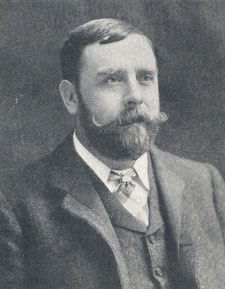Theatre architect. Born Newton Abbot, Devon. Never qualified as an architect but designed at least 80 theatres and did some work on about the same number again. About 24 of his theatres survive reasonably intact, including the Hackney Empire, Richmond Theatre, London Palladium, Victoria Palace and the London Coliseum. Died at home in Westcliff-on-Sea. Buried Highgate cemetery.
This section lists the memorials where the subject on this page is commemorated:
Frank Matcham
Commemorated ati
Brixton Theatre foundation stone
Although not actually named, this lonely, vandalised stone is all that remain...
Frank Matcham - Coliseum
We thank our colleague for spotting and snapping this on a recent visit to th...
Frank Matcham - Hackney Empire
Frank Matcham (1854 - 1920) theatre architect, designed this theatre.
Frank Matcham - N8
Plaque unveiled by the husband and wife actors Timothy West and Prunella Scales.
Other Subjects
Alfred Cross
Architect. Born Alfred William Stephens Cross in Blackheath. 1889-99 he was in a partnership with Henry Spalding. He specialised in designs for public baths. Died London. Information from Manchest...
William Leverton
Architect, builder and surveyor. Churchwarden at St Giles Church in 1800.
Chelsea Embankment
Designed by Sir Joseph Bazalgette. Apart from providing a pleasant riverside walk, it was built with the dual purpose of providing a flood barrier and as a covering for the main low level sewer for...
John Barnett
Designed houses in Kensington, Clapham and Highbury. Seems not much is known about him.
Previously viewed
General John Burgoyne
W1, Hertford Street, 10
The Oxford Dictionary of National Biography gives his birth year as 1723.
King's College Hospital
Stood at Portugal Street / Carey Street from 1839 to 1913, when it moved to Denmark Hill, to a site given to it by WFD Smith, of W.H.Smiths.
Crayford Manor House Historical Society
They don't seem to have a website of their own but we did find this: The Fabric of Our Town, "put together by Bexley Local Studies and Archive Centre, in partnership with Crayford Manor House Histo...
Aston Martin
Lionel Martin and Robert Bamford formed the company, initially as Bamford and Martin Ltd. They used the garage at the site of the plaque as a workshop and here they developed their first model th...
Millbank Prison - Atterbury Street
SW1, Atterbury Street
There are two (well, we've only found two) of these giant bollards commemorating Millbank Prison and the transportation of prisoners. Se...















Comments are provided by Facebook, please ensure you are signed in here to see them